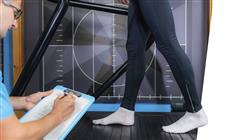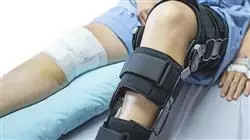University certificate
Scientific endorser

The world's largest faculty of nursing”
Introduction to the Program
You will incorporate the most advanced sports methodology and techniques into your daily practice, presented by a teaching staff of exceptional professionalism’’

There has been a gradual increase in healthier sporting habits, as well as greater demands in high-performance sports, making the role played by sports nurses even more crucial to any institution or team. Their work in assisting and preventing common sports injuries, as well as their ability to coordinate sporting events of various kinds, positions them favorably in a professional sense providing them with good prospects for the future.
Nurses cannot limit their expertise to a specific area of sports care, but, in contrast, they must continually expand their knowledge and update themselves in order to meet the most demanding requirements in the High Performance Sports sector. This program includes modules that cover the nutritional, psychological and pathological aspects of the athlete from an innovative and modern perspective and based on the most up-to-date scientific theories and studies.
This is combined with an eminently practical vision of the theory covered, with a thorough review of real cases that demonstrate the advantage of possessing up-to-date knowledge of highly demanding sports environments. This contextualization will provide a great boost to nurses’ whose aim is to update their knowledge, as it allows them to progress more effectively through the topics covered.
In order to make this program as flexibile and adaptable to any pace of life, TECH has created a completely online format for the entire program. For this reason, we have eliminated both face-to-face classes and fixed schedules, in order to give nurses the freedom to choose how to manage their studies alongside their daily commitments.
Get up to date on the latest developments in sports nutrition, with an energy expenditure assessment updated to meet the highest sporting standards’’
This Professional master’s degree in Sports Nursing contains the most complete and up-to-date program on the market. The most important features include:
- The development of case studies presented by experts in nursing focused on the world of sports
- The graphic, schematic, and practical contents with which they are created, provide practical information on the disciplines that are essential for professional practice
- Practical exercises where self-assessment can be used to improve learning
- Special emphasis on innovative methodologies
- Theoretical lessons, questions to the expert, debate forums on controversial topics, and individual reflection assignments
- Content that is accessible from any fixed or portable device with an Internet connection
Access rich learning material containing a multitude of detailed videos, high quality multimedia content alongside complementary readings to further your knowledge of the topics that interest you the most’’
TECH’s teaching staff includes professionals from the sector who contribute their work experience to this training program, as well as renowned specialists from leading societies and prestigious universities.
The multimedia content, developed with the latest educational technology, will provide the professional with situated and contextual learning, i.e., a simulated environment that will provide immersive training programmed to learn in real situations.
This program is designed around Problem-Based Learning, whereby the professional must try to solve the different professional practice situations that arise during the academic year. For this purpose, the student will be assisted by an innovative interactive video system created by renowned and experienced experts.
You will not have to sacrifice any aspect of your personal or professional life to take on this degree, thanks to the fact that it is a 100% online master’s degree"

Learn about the most advanced modes of sample collection and the methodology used in anti-doping controls"
Why study at TECH?
TECH is the world’s largest online university. With an impressive catalog of more than 14,000 university programs available in 11 languages, it is positioned as a leader in employability, with a 99% job placement rate. In addition, it relies on an enormous faculty of more than 6,000 professors of the highest international renown.

Study at the world's largest online university and guarantee your professional success. The future starts at TECH”
The world’s best online university according to FORBES
The prestigious Forbes magazine, specialized in business and finance, has highlighted TECH as “the world's best online university” This is what they have recently stated in an article in their digital edition in which they echo the success story of this institution, “thanks to the academic offer it provides, the selection of its teaching staff, and an innovative learning method aimed at educating the professionals of the future”
A revolutionary study method, a cutting-edge faculty and a practical focus: the key to TECH's success.
The most complete study plans on the university scene
TECH offers the most complete study plans on the university scene, with syllabuses that cover fundamental concepts and, at the same time, the main scientific advances in their specific scientific areas. In addition, these programs are continuously being updated to guarantee students the academic vanguard and the most in-demand professional skills. In this way, the university's qualifications provide its graduates with a significant advantage to propel their careers to success.
TECH offers the most comprehensive and intensive study plans on the current university scene.
A world-class teaching staff
TECH's teaching staff is made up of more than 6,000 professors with the highest international recognition. Professors, researchers and top executives of multinational companies, including Isaiah Covington, performance coach of the Boston Celtics; Magda Romanska, principal investigator at Harvard MetaLAB; Ignacio Wistumba, chairman of the department of translational molecular pathology at MD Anderson Cancer Center; and D.W. Pine, creative director of TIME magazine, among others.
Internationally renowned experts, specialized in different branches of Health, Technology, Communication and Business, form part of the TECH faculty.
A unique learning method
TECH is the first university to use Relearning in all its programs. It is the best online learning methodology, accredited with international teaching quality certifications, provided by prestigious educational agencies. In addition, this disruptive educational model is complemented with the “Case Method”, thereby setting up a unique online teaching strategy. Innovative teaching resources are also implemented, including detailed videos, infographics and interactive summaries.
TECH combines Relearning and the Case Method in all its university programs to guarantee excellent theoretical and practical learning, studying whenever and wherever you want.
The world's largest online university
TECH is the world’s largest online university. We are the largest educational institution, with the best and widest online educational catalog, one hundred percent online and covering the vast majority of areas of knowledge. We offer a large selection of our own degrees and accredited online undergraduate and postgraduate degrees. In total, more than 14,000 university degrees, in eleven different languages, make us the largest educational largest in the world.
TECH has the world's most extensive catalog of academic and official programs, available in more than 11 languages.
Google Premier Partner
The American technology giant has awarded TECH the Google Google Premier Partner badge. This award, which is only available to 3% of the world's companies, highlights the efficient, flexible and tailored experience that this university provides to students. The recognition as a Google Premier Partner not only accredits the maximum rigor, performance and investment in TECH's digital infrastructures, but also places this university as one of the world's leading technology companies.
Google has positioned TECH in the top 3% of the world's most important technology companies by awarding it its Google Premier Partner badge.
The official online university of the NBA
TECH is the official online university of the NBA. Thanks to our agreement with the biggest league in basketball, we offer our students exclusive university programs, as well as a wide variety of educational resources focused on the business of the league and other areas of the sports industry. Each program is made up of a uniquely designed syllabus and features exceptional guest hosts: professionals with a distinguished sports background who will offer their expertise on the most relevant topics.
TECH has been selected by the NBA, the world's top basketball league, as its official online university.
The top-rated university by its students
Students have positioned TECH as the world's top-rated university on the main review websites, with a highest rating of 4.9 out of 5, obtained from more than 1,000 reviews. These results consolidate TECH as the benchmark university institution at an international level, reflecting the excellence and positive impact of its educational model.” reflecting the excellence and positive impact of its educational model.”
TECH is the world’s top-rated university by its students.
Leaders in employability
TECH has managed to become the leading university in employability. 99% of its students obtain jobs in the academic field they have studied, within one year of completing any of the university's programs. A similar number achieve immediate career enhancement. All this thanks to a study methodology that bases its effectiveness on the acquisition of practical skills, which are absolutely necessary for professional development.
99% of TECH graduates find a job within a year of completing their studies.
Professional Master's Degree in Sports Nursing
The Professional Master's Degree in Sports Nursing is a specialized postgraduate program that provides nurses with the necessary skills and knowledge to care for athletes and people who practice physical activity. In this sense, Nursing professionals play a key role in preventing and treating sports injuries, improving physical performance and promoting healthy habits.This TECH program offers comprehensive education in areas such as exercise physiology, sports nutrition, psychology applied to sport and the prevention and treatment of sports injuries. Students will be able to acquire practical skills in the field of training, rehabilitation and evaluation of the physical condition of athletes.Sports Nursing is a discipline in constant evolution due to the continuous advances in the world of sport. Therefore, updating knowledge is essential to be able to provide quality care and be up to date with the latest trends and practices in the field of sports.
Specialize in Sports Nursing
This 1-year, online Professional Master's Degree in Sports Nursing has a highly specialized teaching team and a rigorous syllabus that allows nurses to acquire the skills and knowledge necessary to become experts in the care of athletes.In short, TECH's Professional Master's Degree in Sports Nursing is an excellent opportunity for nurses who wish to specialize in this constantly growing field, and for those looking to improve their skills and knowledge in the care of athletes and people who practice physical activity. Moreover, as it is 100% online learning, it adapts perfectly to the needs and schedules of professionals looking to combine their study with their personal and professional life.







